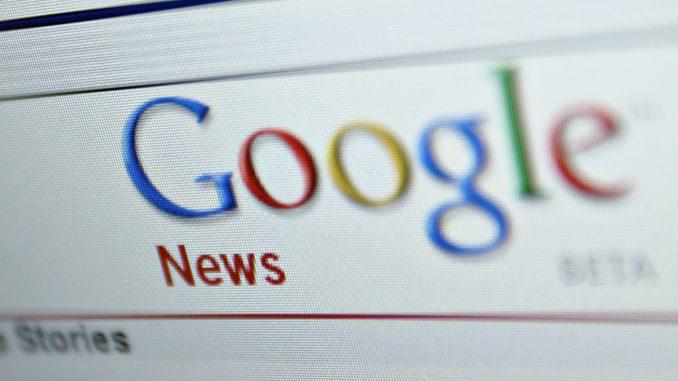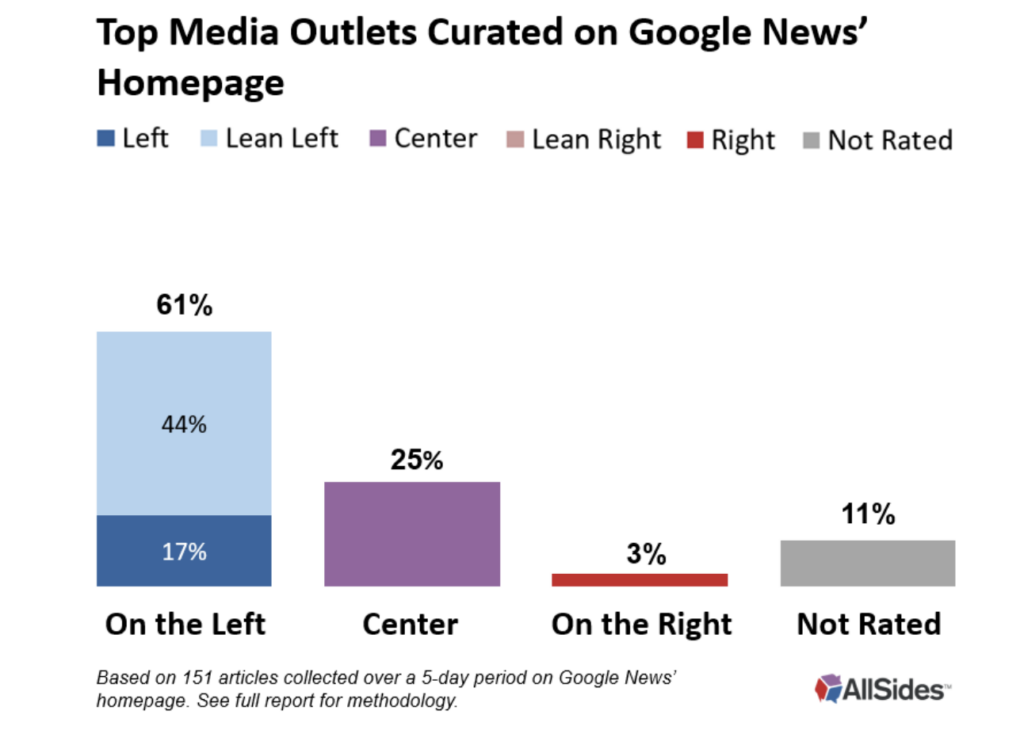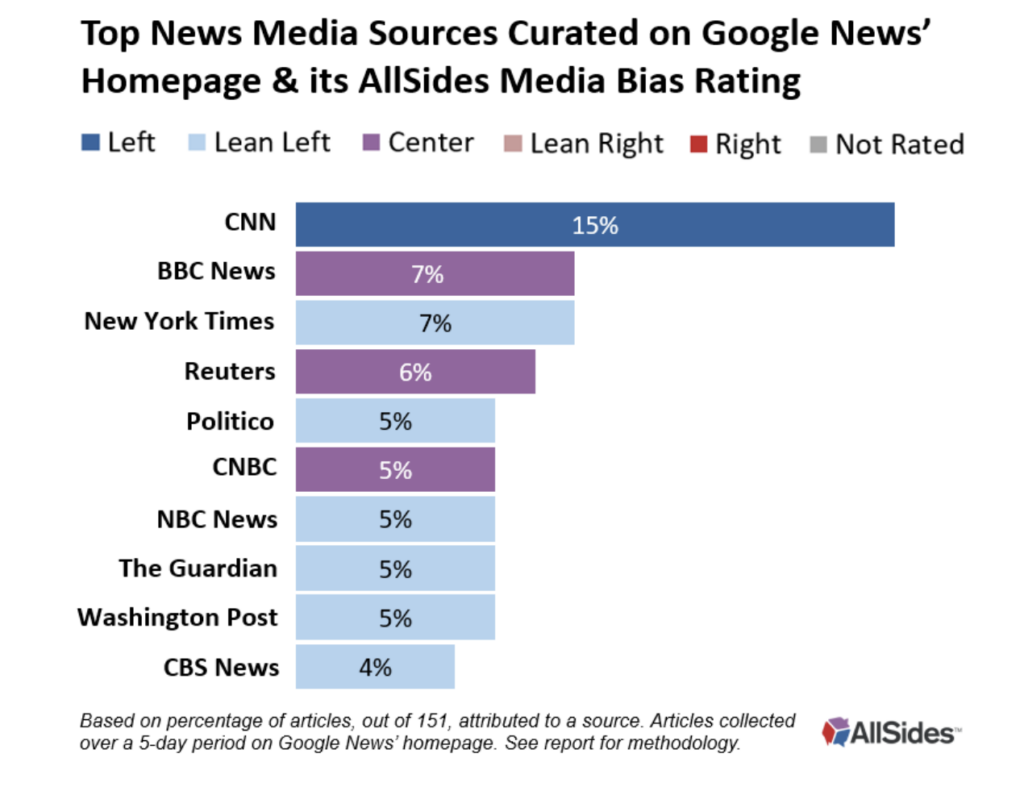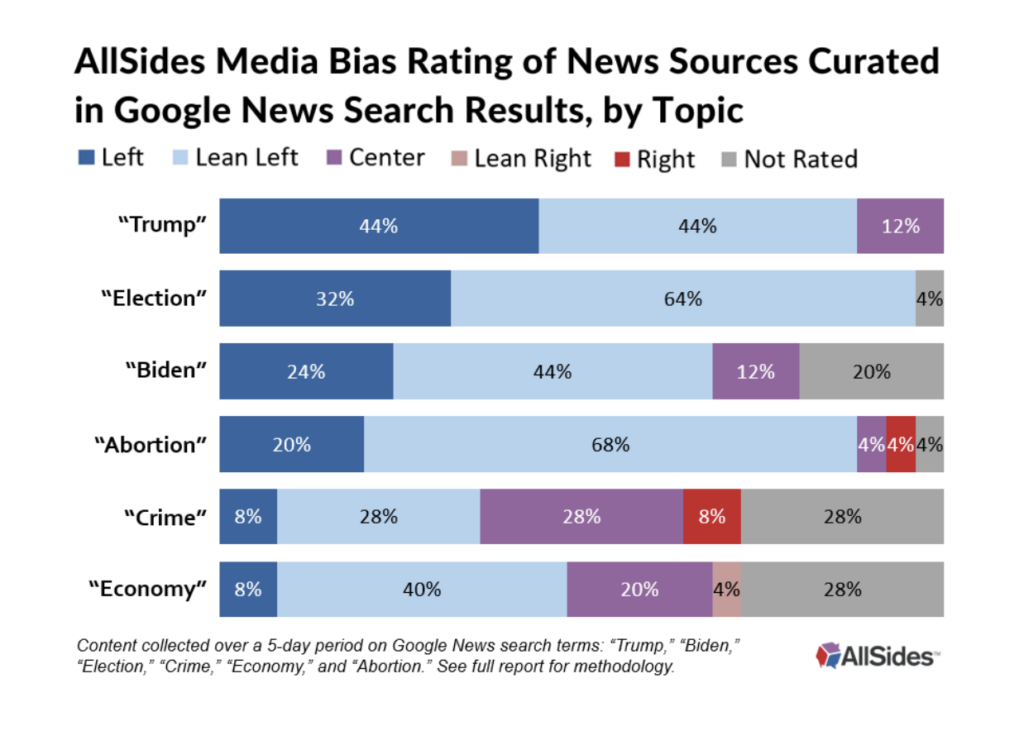
Google News heavily skewed in favor of left-leaning media outlets—both in the news articles featured on its homepage and in the search results for specific topics—in five of the days leading up to the 2022 midterm elections, according to an AllSides study Google criticized as “deeply flawed” in comments to The Daily Signal.
“Imbalanced or heavily biased news search results can have a negative impact on our democracy and elections,” Julie Mastrine, director of marketing and media bias ratings at AllSides, told The Daily Signal in a statement Tuesday. “When people cannot access the full range of views on political and societal issues, they are subject to partisan manipulation and cannot truly decide for themselves.”
“The AllSides balanced newsfeed solves the problem of biased online news aggregation by curating articles from the left, center, and right, so people can get diverse perspectives and think for themselves,” she added.
For its part, Google claimed the study “cherry-picked a few topics” for a “brief period of time,” presenting a “misleading picture of Google News.”
AllSides, a media company dedicated to presenting balanced news and diverse perspectives, analyzed the Google News homepage and search results from Oct. 31 to Nov. 4, 2022, checking them alongside AllSides’ media bias chart.
The study found that 61% of media outlets on Google News’ homepage skewed to the Left—17% Left and 44% lean Left—while 25% hewed to the center, and only 3% had a conservative bias—3% Right, 0% lean Right.

The homepage heavily featured CNN, which AllSides rates as “Left,” at 15%. “Lean Left” outlets included The New York Times (7%), Politico (5%), NBC News (5%), The Guardian (5%), The Washington Post (5%), and CBS News (4%). “Center” outlets included BBC News (7%), Reuters (6%), and CNBC (5%).

AllSides also analyzed Google News search results on six specific search terms: “Trump” (88% Left or Lean Left), “Election” (96% Left or lean Left), “Biden” (68% Left or lean Left), “Abortion” (88% Left or lean Left), “Crime” (36% Left or lean Left), and “Economy” (48% Left or lean Left). Google News rarely featured conservative-leaning outlets, with a mere 8% of results featuring Right outlets on crime, the largest showing.

AllSides used various methods to obtain objective results, including accessing the Google News homepage in a private browser, blocking cookies, and incorporating “spot checks” to ensure that the same content appeared for different AllSides team members accessing Google News from different locations in the U.S. The analysts did not customize their Google News settings, to avoid personal impacts on the results.
AllSides uses blind bias surveys of Americans across the political spectrum and expert panel reviews from a multipartisan group in order to prevent one individual or group from having a disproportionate impact on the ratings.

AllSides analyzed only the outlets Google News featured, not the specific articles. The report emphasizes that it does not include any determinations on whether Google News’ political leanings or biases are intentional. “Whether Google should provide a broader or more balanced diversity of perspectives, and whether that would support or hinder a healthier democratic society, is a philosophical or ethical question beyond the bounds of this analysis,” the report states.
A Google spokesperson panned the report in comments to The Daily Signal.
“Our systems do not take political ideology into account, and we go to extraordinary lengths to build our products for everyone,” the spokesperson said. “This study’s methodology is deeply flawed. It cherry-picked a few topics and ran for a very brief period of time, presenting a misleading picture of Google News.”
Google also pointed to information on its news publisher help center, noting that its algorithms focus on features such as relevance, authoritativeness, and freshness, rather than political ideology. The company also highlighted a 2019 study from The Economist, which found that “Google rewards reputable reporting more than left-wing politics. Our statistical study revealed no evidence of ideological bias in the search engine’s news tab.”
John Gable, CEO of AllSides, told The Daily Signal that Google News‘ biased results could be “an accident” of Google’s algorithms or a byproduct of a slant in overall internet news content.
“It is possible that an informal policy or the preferences of Google News leadership or employees intentionally support delivering a certain political bias in its news aggregation,” Gable said. “It is also possible that the biased results could be an accident of the algorithms and systems Google uses, or it could reflect the bias of internet news content overall.
“It might also suggest that one political side has been more effective at online communication and marketing than another. Finally, it could just be profit motive, either intentional or accidental, in which news from one political side leads to more views, clicks, and ad revenue than others,” he added.
“Even if not intentional, Google appears to have decided that the problem of political bias is not a sufficiently important problem to address, or has so far been unable to address it effectively,” Gable said. “Regardless of the cause or intent, if Google News intends to support a free and independent democratic society and provide its readers with the ability to consume a variety of perspectives and decide for themselves the best course, it is failing in that objective.”
Google did not respond to follow-up questions about the possibility that its results might be unintentionally biased or that the outlets it features—while generally reliable—may present biased news, especially after serious hits to the legacy media narratives on Hunter Biden’s laptop and the theory that COVID-19 leaked from a lab.
Have an opinion about this article? To sound off, please email letters@DailySignal.com, and we’ll consider publishing your edited remarks in our regular “We Hear You” feature. Remember to include the URL or headline of the article plus your name and town and/or state.

